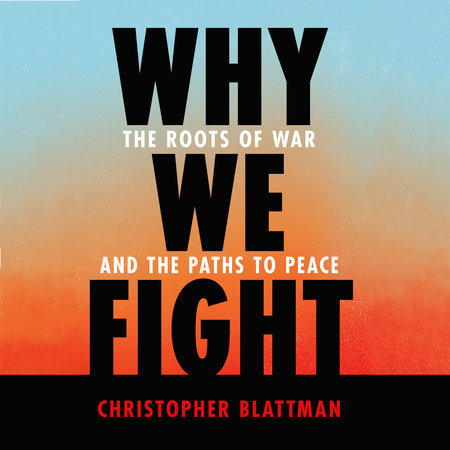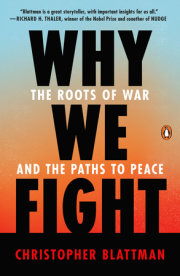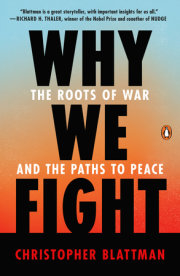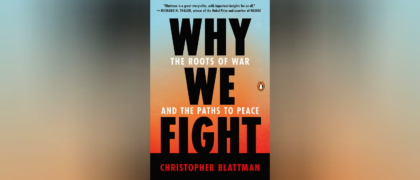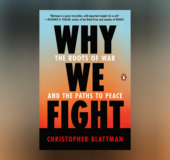"As what could end up as Europe’s bloodiest war since 1945 grinds on, this is an apposite time for a book explaining why and when human beings fight… Blattman identifies five “logical ways” why, despite all the reasons to compromise, people opt to fight. All five map quite neatly onto the war in Ukraine. [A] valuable guide, supported by engaging anecdotes, to what makes people turn to violence—and why, mercifully, they are usually too sensible to do so.”—The Economist
“Blattman deftly translates knotty ideas from game theory and social choice theory for a lay audience, weaving in colorful anecdotes from his own life and travels.”—Foreign Affairs
"Noting that the high costs of violence almost always make peaceful agreement a better solution to antagonisms than violence, University of Chicago economist Blattman analyzes forces that often counteract that logic, including the self-interest of leaders, ideological passions, miscalculation of an opponent’s strength or motives, and mistrust… This stimulating discussion of violence illuminates a fraught subject with sober reason."—Publishers Weekly
“Blattman shows us things we don’t normally see and takes us to places we might be terrified to go. A captivating and intelligent book.”—Tim Harford, author of The Data Detective and The Undercover Economist
“Engaging and profound, this deeply searching book explains the true origins of warfare, and it illustrates the ways that, despite some contrary appearances, human beings are capable of great goodness.”—Nicholas A. Christakis author of Blueprint: The Evolutionary Origins of a Good Society
“A surprisingly and refreshingly optimistic book, one that deserves a place both on living room and diplomats’ shelves.”—Anne-Marie Slaughter, CEO, New America
“An important, radical book that leaves you hopeful that peace is not a dream and conflict is not inevitable.”—David Miliband, president and CEO, International Rescue Committee
“The most important book on this most important topic.”—Tyler Cowen, author of Average Is Over and Marginal Revolution
“Economists imagine that people in poor countries wake up every day worrying that they are poor. Maybe, but more fundamentally they are insecure and subject to violence. Foregrounding this most basic human problem is essential for understanding the world we live in today.”—James A. Robinson, coauthor of Why Nations Fail
“Blattman is the go-to social scientist on war. His insights are essential reading.”—William Easterly, author of The White Man’s Burden and The Tyranny of Experts
“Why We Fight not only reflects Blattman’s expertise in economics, political science, and history, it also introduces us to an intriguing range of characters and locations. We meet a warlord from Liberia called White Flower, and in the same chapter learn why George Washington became America’s wealthiest president. Blattman is a great storyteller, with important insights for us all.” —Richard H. Thaler, winner of the Nobel Memorial Prize in Economic Sciences and coauthor of Nudge
“As we move into the third decade of the twenty-first century, humanity is still mired in wars and deadly conflicts. Avoiding the useless dichotomies that either claim violence is an inseparable part of human nature or declare that humanity has all but conquered its proclivity to war, Christopher Blattman explains how human communities make use of many different strategies to resolve conflicts, and why these efforts sometimes stumble.”—Daron Acemoglu, coauthor of Why Nations Fail

